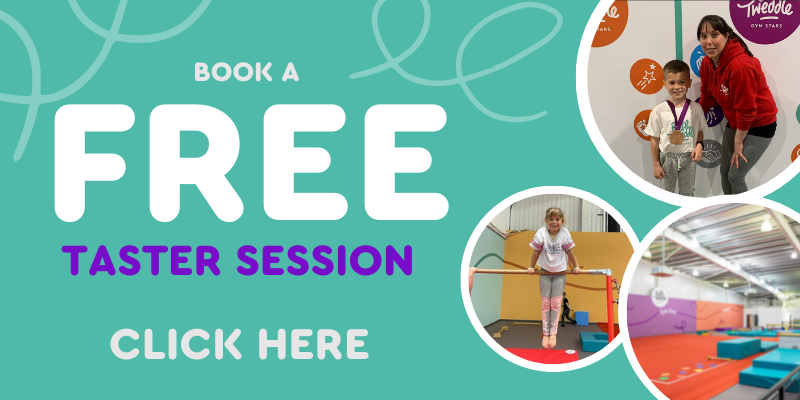The effects of gymnastics on children's mental health and social development
We all know that exercise is good for our children’s physical health, their strength, flexibility and co-ordination. But what about their mental health and social development?
We all want to ensure that our children are growing up to be well-rounded, happy humans with great social skills. But with the demands of schoolwork, social pressure, developing bodies and fluctuating hormones, it can be hard to keep our kids on track.
The good news is, it’s been reported that regular physical exercise has a similar effect on low mood as antidepressants and Cognitive Behavioural Therapy.
Engaging in daily exercise could be just what the doctor ordered and help, not only with their physical health, but their mental health too.
There are heaps of benefits for exercising, especially when it comes to kids’ mental health and social development. Here are some of our favourites…
Better brain function and school performance
As a parent, you want to know that your child is doing well in school so, you’ll be glad to hear that exercise can help their concentration levels and school performance!
Exercise helps to develop their growing brains, improving their energy levels, focus and concentration, which are all needed in the classroom.
Some schools will even get the children moving during class and have regular breaks, so they can get the kids to focus again.
How much exercise youngsters should be getting all depends on their age. Our Beth Tweddle Academy Programme includes 2 hours of fun exercise, where 8+ year olds can train their muscles, learn new skills and increase their energy levels and focus.
What’s also great about this, is that children can develop a great sense of competence through learning and retaining information, increasing their self-esteem and confidence too! So, you end up with a child who is confident in both education and their physical abilities. You can read more about the importance of exercise on school performance here.

Improves sleep and energy levels
As we mentioned in the last point, exercise can increase energy levels thanks to Endorphins (the feel-good chemical). These endorphins are released during exercise and the positive effects can last a few hours afterwards too.
You’ve probably noticed this when your child is playing in the park or with friends. They perk up, even if they didn’t want to do it beforehand. So, encouraging them to take part in a sport or do some sort of moderate to high intensity exercise will pay off once they get going.
Not only that, but exercising is tiring for your little one’s muscles which is needed for development and growing! We all know how tired we feel when our bodies have been on the go a lot, we’ve been to the gym or had a game of Rounders in the garden with the kids.
It’s worth mentioning though, that whilst exercise can make our kids sleepy, it is best not to get them leaping and bounding right before bedtime, as endorphins will still be running high as you’re trying to settle them down for the night.

Reduces anxiety and stress
You might have heard that exercising can help with symptoms of anxiety and stress. It’s true. Those endorphins we were just talking about make us feel happy and they can trigger a feeling of euphoria, helping us to be happier throughout the day.
Serotonin is another amazing chemical that is released during exercise that plays a role in children’s digestion, sleep, bone health and mood.
By engaging in an exercise such as gymnastics, your child can increase their levels of serotonin and endorphins, making them feel happier, more balanced and energised, all whilst learning new skills and making lifelong friends.

Improves self-esteem, confidence and self-worth
An improved self-esteem can increase a child’s confidence and sense of self-worth, a vital part of mental health as we grow into adulthood.
Taking part in a hobby where your child can work towards small goals and achieve success, will give them a sense of competency and self-belief. Completing this in a supportive environment alongside friends and family is a hugely important step in the journey of self-discovery that each of our kids go on through their childhood.
At Beth Tweddle Gymnastics, your child will work towards achieving badges, certificates and stickers during their BTG journey, which will all help to increase their confidence and self-esteem, as well as develop determination and perseverance which are also fantastic life skills!
Improves social interactions
And lastly, but certainly not least, is the incredible social development and interaction that children gain from group exercise.
Exercise at all ages can involve life skills such as turn-taking, sharing and playing cooperatively with others. As they get a little older, building the confidence to interact and make friends with other kids can help to prevent feelings of isolation.
Group physical exercise can help them to feel a sense of belonging instead, and becoming part of the BTG Community can provide them with just that!

The Bottom Line
It's clear that exercise is not only important for children's physical health but also has a profound effect on their mental health and social development. By engaging in regular physical activity, children can benefit from improved brain function, better sleep, reduced anxiety and depression, increased self-esteem and confidence, and improved social interactions.
At Beth Tweddle Gymnastics, we believe in the power of exercise to promote these benefits and create a strong sense of community among our young athletes.
So, let's encourage our children to get moving and reap the many rewards that exercise, and gymnastics, has to offer!
If your child is yet to experience the incredible benefits and joys of gymnastics and wants to make lifelong friends, start their journey by jumping into one of our FREE taster sessions.

